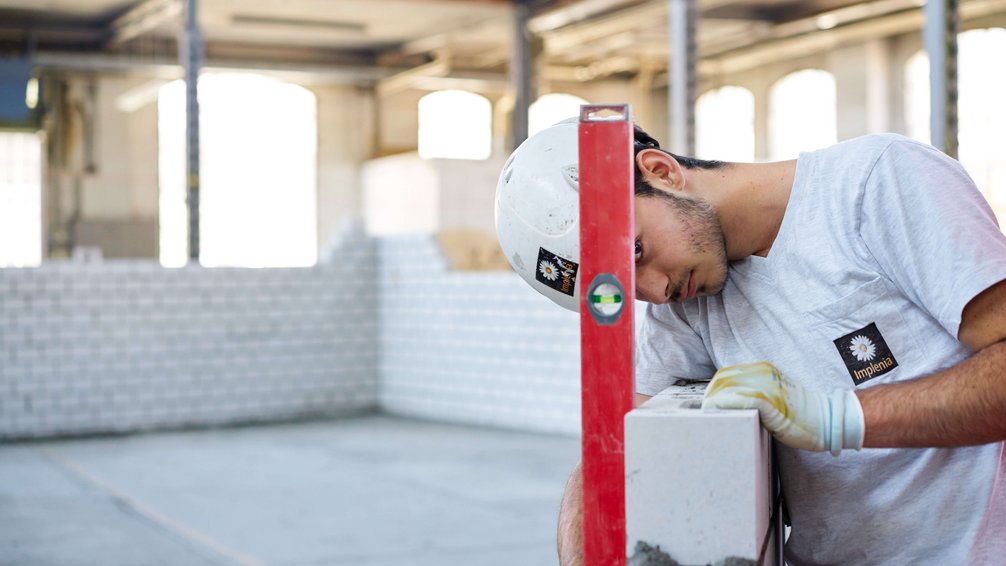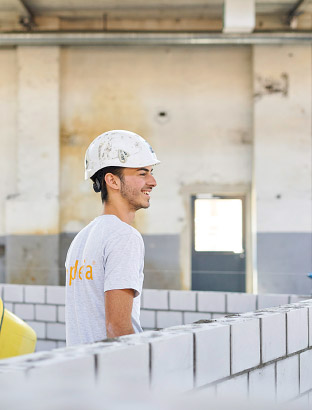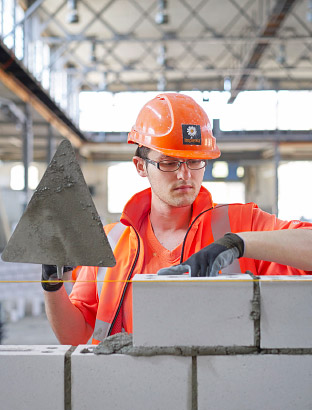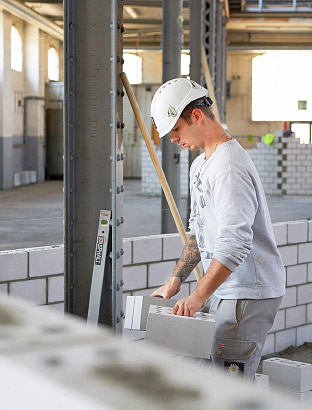We’re not just here for the fun of it

Adrian Geissman runs his hand over the light grey sand-lime bricks and tries to rub away some flecks of mortar. “The individual bricks are still too dirty, and you can’t get rid of the streaks,” he says. However, the Apprenticeship and Development Manager, who works for Building Construction and Modernisation Zurich and Aarau, is satisfied with his students’ work. He follows his critical remarks with praise: “You have done good work so far.” For about a week now, the first-year apprentices have been building a wall – 77 metres long and nearly 3 metres high – in an old industrial hall in Winterthur. So far they have built 9 of the 18 courses of brick.
More than 60 young men are currently learning the masonry trade at Implenia. Despite the name of their trade, they won’t actually have to wield a trowel all that often in everyday working life. “It’s much more common to use concrete in Switzerland these days,” says Geissmann. In construction, as elsewhere, there is an increasing trend towards specialisation and the time pressures are enormous, he tells us. So brick walls tend to be built by specialist firms. “In this type of environment, ensuring that our apprentices can utilise their skills in practice is always a big challenge,” says Geissmann.
A project like this one here in the Werk 1 sector of the Sulzerareal site in Winterthur presents a perfect opportunity. The Künstlergruppe Winterthur (Winterthur Artists Group) asked Implenia to let it use a hall for its anniversary exhibition, and to build an industrial-style wall that could be used to hang pictures (see box). Implenia was keen to support the artists, and when Adrian Geissmann heard about the plan, he asked if the apprentice masons could do the work.
“Thanks to its size, Implenia is always in a position to arrange for apprentice construction sites like this,” says Olga Bolliger. Previously a mason and a site manager herself, Bolliger is now responsible for coordinating and developing apprenticeships at Implenia. These apprenticeship projects are designed to stretch and encourage the young workers, with the apprentices working largely independently in teams. “As well as practical knowledge,” says Bolliger, “the main thing they learn is how to take responsibility.”
“You have to find the rhythm,” says Nikola Jovanovic, one of the apprentices, as he digs his triangular trowel into the trough of mortar. “Eventually you get the right feel.” Like his colleagues, he is enthusiastic about the work in Winterthur. “On construction sites we apprentices usually only put up formwork, so it’s important for us to work on projects like this where we can put up real walls.”
“After building this long wall everyone will be doing it right,” says Raphael Thurnherr. Each brick weighs 10 kilos, and each mason will put two hundred of them in place every day. But strength isn’t everything. You need to use your head for this kind of work too, and you need stamina. No wonder the eight apprentices on site today are working with such concentration. “We are not here just for the fun of it,” says the young foreman. There’s a job to be done.
Anyone wanting do to an apprenticeship at Implenia has a list of around a dozen trades to choose from. The main ones are road builders, masons and commercial staff; but there are also construction interns, foundation workers, carpenters, joiners, woodworkers, IT specialists, building technology planners, logistics specialists, construction machinery mechanics and road building interns. An apprenticeship at Switzerland’s leading construction services provider can be the starting point for a professional career in construction, leading eventually to a job as a foreman or construction manager.
Implenia believes that training young specialists is not just part of a modern employer’s responsibility, but that it directly helps achieve corporate goals, especially in an industry plagued by a lack of specialist workers. “These apprentices give us a future,” is how Olga Bolliger sums it up.
It comes as no surprise, then, that Implenia has been stepping up its efforts in recent years. At the end of 2014, the Group created the role to which Olga Bolliger was appointed: a central coordinator for around 220 apprentices across Switzerland. She is intensifying communication between the 40 or so occupational trainers who, like Adrian Geissmann, look after the apprentices at various Implenia sites. The new Head of Apprentices also launched an internal development course for practical instructors – i.e. the people who show the apprentices how to practise their craft on site.
The transition from compulsory schooling to professional training presents young people with numerous challenges. Anyone who decides to do an apprenticeship at Implenia will receive a lot of support from the company’s own professionals during this tricky period, starting with an induction week in Melchtal.
The intensive support continues even after the induction week. Every two months, Adrian Geissmann calls a meeting where apprentices give their own presentations on issues such as safety at work, finances or the environment. It also gives them a chance to talk to each other and discuss things. “I already have some experience, but I think it’s great here at Implenia. Our manager is always there for us,” says Edison Miguez, who has already worked in construction for four years without any training, and who is now learning the masonry trade properly.
Sustainability and social responsibility are core principles at Implenia, and in order to broaden the apprentices’ social outlook they now take part in a social or charitable project in their third year of training. The aim of this special week is for the apprentices to learn how to get on with each other better, and to do something for a good cause. They will hopefully also learn that voluntary work can be fun and enriching. “The training period at Implenia should benefit everyone on all sorts of different levels,” says Olga Bolliger in summary.
This concept of mutual give-and-take, encouragement and challenge seems to be going down well. Most apprentices who complete the course want to move directly into a professional career at Implenia. About two thirds of them on average are offered a job. Adrian Geissmann measures the success of his work by the fullness of his inbox. “Despite the demographic dip, I’m getting a lot of applications,” he says, “which certainly has at least something to do with our reputation for giving apprentices a good training.”
ART EXHIBITION IN WERK 1

Implenia is building a new, mixed and sustainable neighbourhood on the Sulzerareal site in Winterthur. As well as providing homes and workplaces it will also host educational facilities. Before the work really began, Implenia temporarily made Halle 1020 available to Künstlergruppe Winterthur (Winterthur Artists Group) in mid-June 2016 so it could stage a major exhibition in celebration of its 100th anniversary. Both sides of the zigzag “line wall” – built by apprentices down the middle of the hall – were used to hang works of art. Sculptures, objects and installations were displayed in the two halves of the room created by the wall. Implenia made the hall and the bricklayers available free of charge as sponsorship in kind.





